人教版(2019)选择性必修第二册UNIT 4 Journey Across a Vast Land Learning About Language课件 (共24张PPT)
文档属性
| 名称 | 人教版(2019)选择性必修第二册UNIT 4 Journey Across a Vast Land Learning About Language课件 (共24张PPT) |  | |
| 格式 | pptx | ||
| 文件大小 | 1.9MB | ||
| 资源类型 | 教案 | ||
| 版本资源 | 人教版(2019) | ||
| 科目 | 英语 | ||
| 更新时间 | 2023-11-05 16:59:12 | ||
图片预览

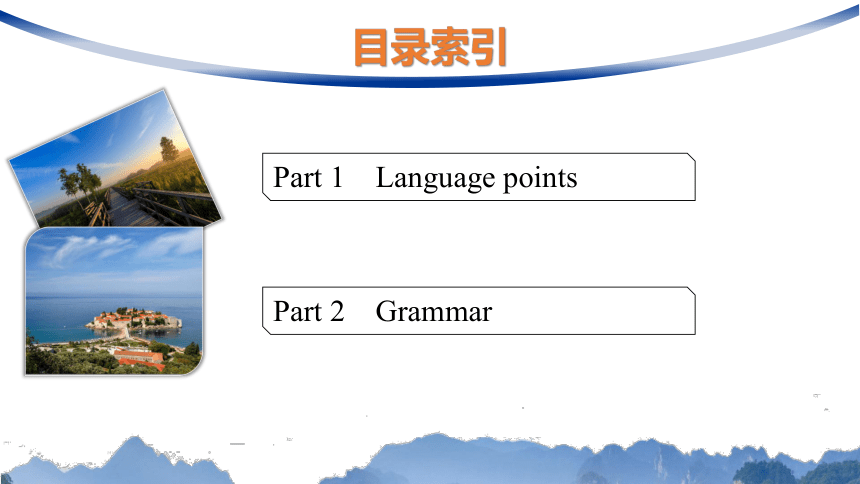
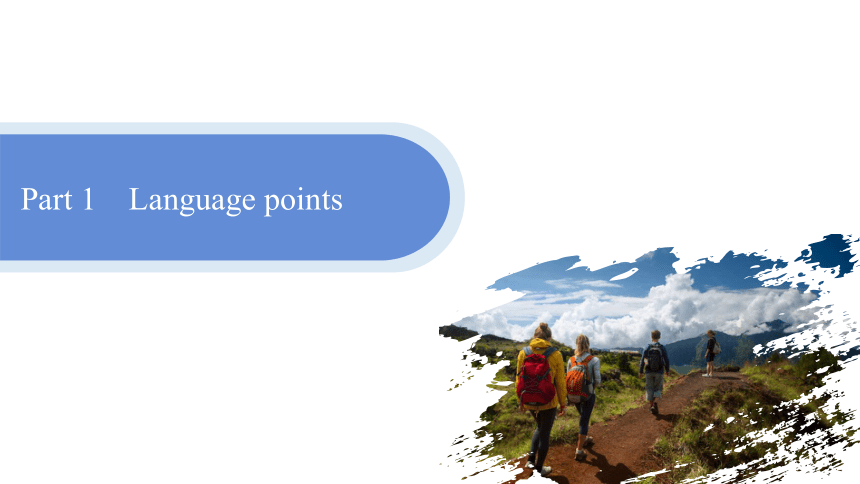
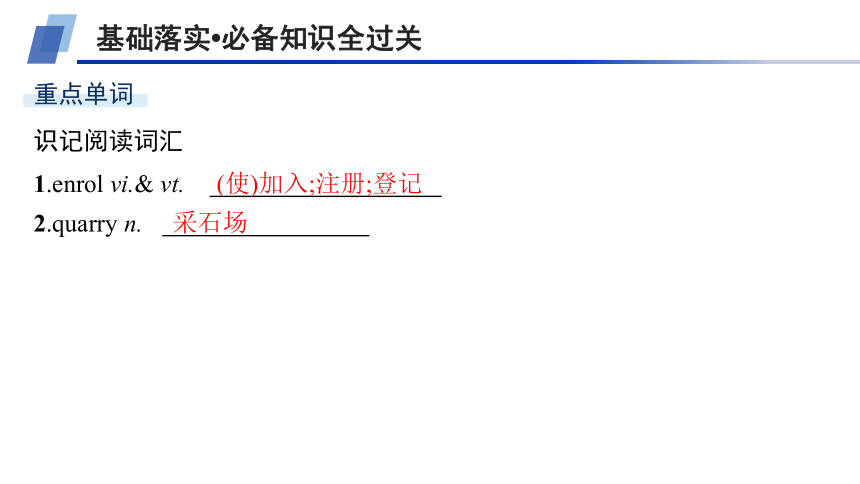
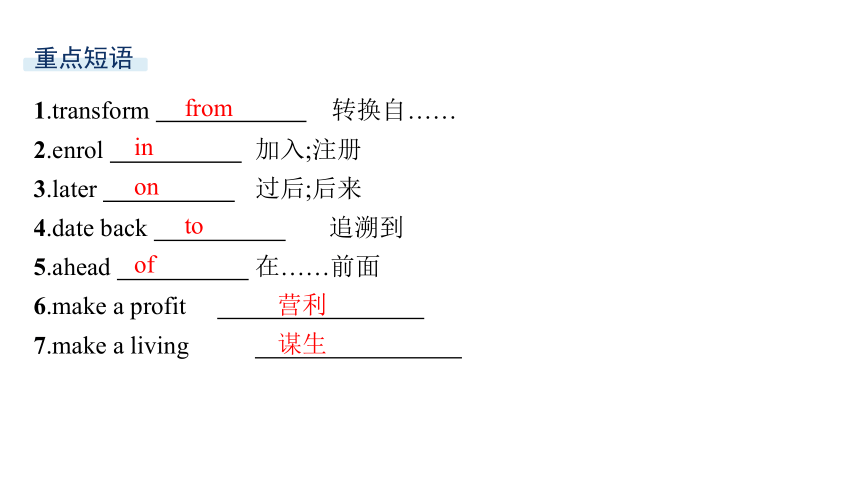
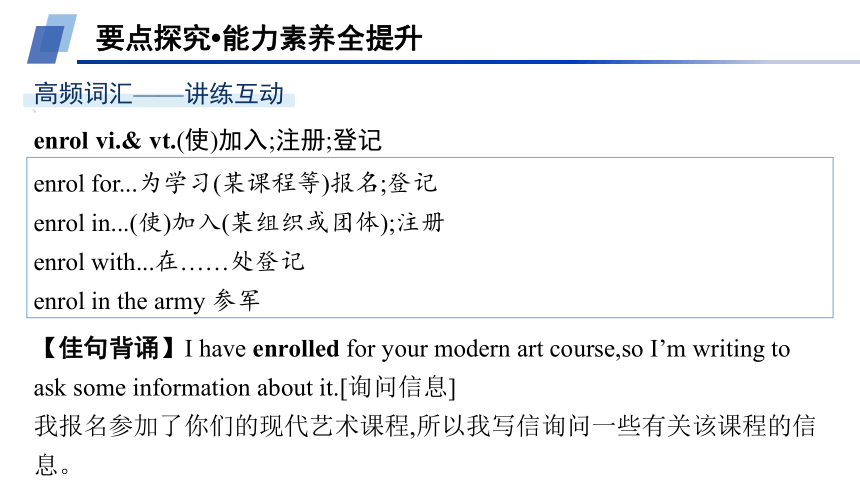
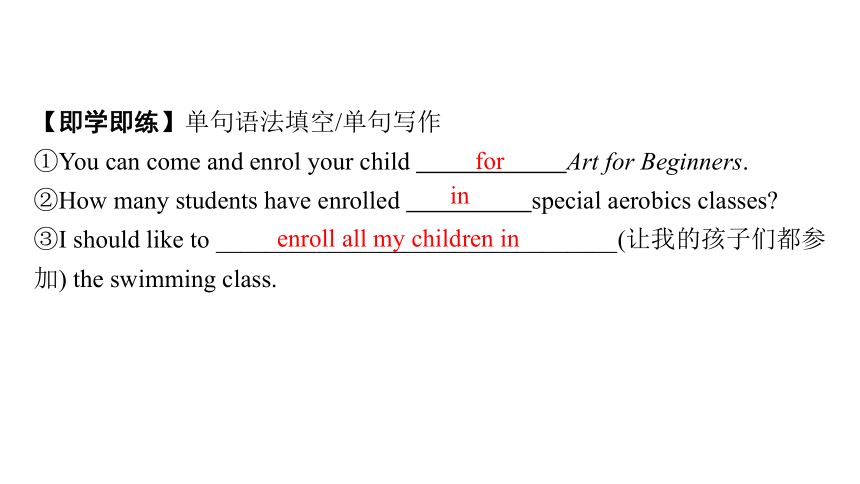
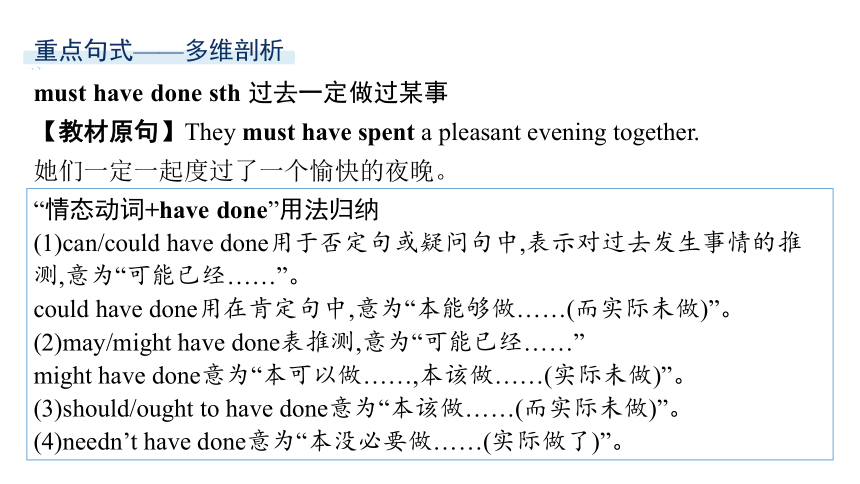
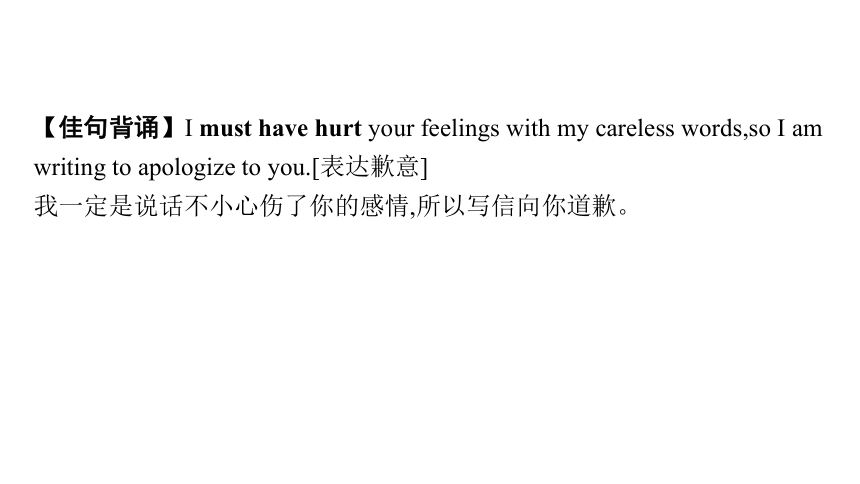
文档简介
(共24张PPT)
UNIT 4 JOURNEY ACROSS A VAST LAND
Section B Learning About Language
Part 1 Language points
Part 2 Grammar
目录索引
Part 1 Language points
基础落实 必备知识全过关
重点单词
识记阅读词汇
1.enrol vi.& vt.
2.quarry n.
(使)加入;注册;登记
采石场
重点短语
1.transform 转换自……
2.enrol 加入;注册
3.later 过后;后来
4.date back 追溯到
5.ahead 在……前面
6.make a profit
7.make a living
from
in
on
to
of
营利
谋生
要点探究 能力素养全提升
、
高频词汇——讲练互动
enrol vi.& vt.(使)加入;注册;登记
enrol for...为学习(某课程等)报名;登记
enrol in...(使)加入(某组织或团体);注册
enrol with...在……处登记
enrol in the army 参军
【佳句背诵】I have enrolled for your modern art course,so I’m writing to ask some information about it.[询问信息]
我报名参加了你们的现代艺术课程,所以我写信询问一些有关该课程的信息。
【即学即练】单句语法填空/单句写作
①You can come and enrol your child Art for Beginners.
②How many students have enrolled special aerobics classes
③I should like to ________________________________(让我的孩子们都参加) the swimming class.
for
in
enroll all my children in
.、
重点句式——多维剖析
must have done sth 过去一定做过某事
【教材原句】They must have spent a pleasant evening together.
她们一定一起度过了一个愉快的夜晚。
“情态动词+have done”用法归纳
(1)can/could have done用于否定句或疑问句中,表示对过去发生事情的推测,意为“可能已经……”。
could have done用在肯定句中,意为“本能够做……(而实际未做)”。
(2)may/might have done表推测,意为“可能已经……”
might have done意为“本可以做……,本该做……(实际未做)”。
(3)should/ought to have done意为“本该做……(而实际未做)”。
(4)needn’t have done意为“本没必要做……(实际做了)”。
【佳句背诵】I must have hurt your feelings with my careless words,so I am writing to apologize to you.[表达歉意]
我一定是说话不小心伤了你的感情,所以写信向你道歉。
【即学即练】单句语法填空/单句写作
①This glass is cracked.Somebody have dropped it.
②My dictionary is gone.Who have taken it
③There were still 30 minutes left.You not have run so quickly.
④Mr Smith (不可能去) to Beijing,for I saw him in the library just now.
must
can/could
need
can’t/couldn’t have gone
Part 2 Grammar
语法冲关 语言规则全理清
情景导入
过去分词(短语)作状语和表语
★小情景表达(黑体部分使用过去分词)
我们非常高兴地发现这座城市被山环绕。从火车的窗子往外看,山非常高大。我旁边的女孩看到这样的风景很惊奇。被美景吸引,她决定待上两三天。
【例文展示】
(1)We were pleased to see the city was surrounded by mountains.(2)Seen from the train window,the mountains looked massive.(3)The girl next to me was amazed to see such a view.(4)Attracted by the beautiful scenery,she decided to stay for a couple of days.
【语法感悟】
1.句(1)和句(3)中的黑体词都是过去分词作 。
2.句(2)和句(4)中黑体词是过去分词作 。过去分词与逻辑主语之间构成 关系。
表语
状语
被动
语法精讲
一、过去分词(短语)作状语
1.用法
由于过去分词(短语)具有副词的某些特征,因此在句中可以作时间、原因、条件、让步、伴随或结果状语。
(1)时间状语
相当于时间状语从句。可在过去分词前加上连词when,while,until等,使其时间意义更加明确。
Asked why he was late for class,Tom said that he had helped an injured old man.
→When he was asked why he was late for class,Tom said that he had helped an injured old man.
当被问到为什么上课迟到时,汤姆说他帮助了一个受伤的老人。
(2)原因状语
相当于原因状语从句。
Seriously injured,he had to be taken to the hospital.
→Because he was seriously injured,he had to be taken to the hospital.
由于伤得很严重,只好把他送往医院。
(3)条件状语
相当于条件状语从句。可加连词if,unless等转换成条件状语从句。
Given more time,we could do it better.
→If we were given more time,we could do it better.
如果给我们更多时间的话,我们可以做得更好。
(4)让步状语
相当于让步状语从句。可加although,though,even if,even though,whether...or等连词转换成让步状语从句。
Rejected many times,the man did not lose heart.
→Though he was rejected many times,the man did not lose heart.
虽然被拒绝了很多次,这个人并没有失去信心。
(5)方式、伴随状语
相当于and连接的并列句。
The teacher entered the classroom,followed by a group of students.
The teacher entered the classroom,and he was followed by a group of students.
老师进入教室,后面跟着一帮学生。
【温馨提示】
有些过去分词(短语)作状语时不强调被动而重在描述主语的状态。常见的有:seated,hidden,dressed in,lost/absorbed in,tired of,used/accustomed to,addicted to等。
Absorbed in playing the piano,he didn’t notice me come in.
由于专心致志地弹钢琴,他没注意到我进来。
2.过去分词(短语)的独立主格结构
过去分词(短语)作状语时,有时在分词(短语)前加上自己的逻辑主语,这种带有自身逻辑主语的过去分词(短语)被称为独立主格结构。过去分词(短语)的独立结构在句中可以作时间、原因、条件、让步、伴随等。
Her shirt caught on a nail,she could not move.
她的衬衫被钉子钩住了,她动弹不得。
3.过去分词(短语)与动词-ing形式作状语的区别
过去分词与句子的主语之间存在逻辑上的动宾关系,即表示被动,又往往表示完成;动词-ing形式与句子的主语之间存在逻辑上的主谓关系,即表示主动,一般表示动作正在进行。
Read several times,the article is very familiar to me.
由于读了几遍了,这篇文章我很熟悉。
Reading the article,I find there are two spelling mistakes in it.
读这篇文章时,我发现里面有两个拼写错误。
二、过去分词(短语)作表语
1.用法
过去分词(短语)作表语表示主语所处的状态或主观心理感受,相当于形容词的作用。
It’s Sunday,so some of the shops are closed.
今天是星期天,所以有些商店不开门。
When we heard of the story,we were deeply moved.
当听到这个故事时,我们被深深地感动了。
2.过去分词(短语)作表语与被动语态的区别
过去分词(短语)作表语时,强调主语所处的状态;而被动语态表示主语是动作的承受者,强调动作。
The novel was written ten years ago.
这本小说是10年前写的。
The novel is well written.
这本小说写得很好。
3.过去分词(短语)作表语和动词-ing形式作表语的区别
过去分词(短语)作表语时表示主语的状态或心理感受,具有被动含义。而动词-ing形式作表语则表示主语的性质和特征,具有主动含义。
We were surprised at what he said at the meeting.
我们对他在会上说的话感到惊讶。
His words were encouraging,which made all of us encouraged.
他的话鼓舞人心,使我们大家深受鼓舞。
【即学即练】用括号内所给词的适当形式填空
1.After all the guests were (seat),the party began.
2. (impress) by the beautiful scenery,I forgot to go back home in time.
3. (reject) many times,I still want to join the club.
4.Most of the enterprises were highly (satisfy) with the business environment improvement.
5. (lose) in deep thought,the man nearly ran into a tree.
seated
Impressed
Rejected
satisfied
Lost
本 课 结 束
UNIT 4 JOURNEY ACROSS A VAST LAND
Section B Learning About Language
Part 1 Language points
Part 2 Grammar
目录索引
Part 1 Language points
基础落实 必备知识全过关
重点单词
识记阅读词汇
1.enrol vi.& vt.
2.quarry n.
(使)加入;注册;登记
采石场
重点短语
1.transform 转换自……
2.enrol 加入;注册
3.later 过后;后来
4.date back 追溯到
5.ahead 在……前面
6.make a profit
7.make a living
from
in
on
to
of
营利
谋生
要点探究 能力素养全提升
、
高频词汇——讲练互动
enrol vi.& vt.(使)加入;注册;登记
enrol for...为学习(某课程等)报名;登记
enrol in...(使)加入(某组织或团体);注册
enrol with...在……处登记
enrol in the army 参军
【佳句背诵】I have enrolled for your modern art course,so I’m writing to ask some information about it.[询问信息]
我报名参加了你们的现代艺术课程,所以我写信询问一些有关该课程的信息。
【即学即练】单句语法填空/单句写作
①You can come and enrol your child Art for Beginners.
②How many students have enrolled special aerobics classes
③I should like to ________________________________(让我的孩子们都参加) the swimming class.
for
in
enroll all my children in
.、
重点句式——多维剖析
must have done sth 过去一定做过某事
【教材原句】They must have spent a pleasant evening together.
她们一定一起度过了一个愉快的夜晚。
“情态动词+have done”用法归纳
(1)can/could have done用于否定句或疑问句中,表示对过去发生事情的推测,意为“可能已经……”。
could have done用在肯定句中,意为“本能够做……(而实际未做)”。
(2)may/might have done表推测,意为“可能已经……”
might have done意为“本可以做……,本该做……(实际未做)”。
(3)should/ought to have done意为“本该做……(而实际未做)”。
(4)needn’t have done意为“本没必要做……(实际做了)”。
【佳句背诵】I must have hurt your feelings with my careless words,so I am writing to apologize to you.[表达歉意]
我一定是说话不小心伤了你的感情,所以写信向你道歉。
【即学即练】单句语法填空/单句写作
①This glass is cracked.Somebody have dropped it.
②My dictionary is gone.Who have taken it
③There were still 30 minutes left.You not have run so quickly.
④Mr Smith (不可能去) to Beijing,for I saw him in the library just now.
must
can/could
need
can’t/couldn’t have gone
Part 2 Grammar
语法冲关 语言规则全理清
情景导入
过去分词(短语)作状语和表语
★小情景表达(黑体部分使用过去分词)
我们非常高兴地发现这座城市被山环绕。从火车的窗子往外看,山非常高大。我旁边的女孩看到这样的风景很惊奇。被美景吸引,她决定待上两三天。
【例文展示】
(1)We were pleased to see the city was surrounded by mountains.(2)Seen from the train window,the mountains looked massive.(3)The girl next to me was amazed to see such a view.(4)Attracted by the beautiful scenery,she decided to stay for a couple of days.
【语法感悟】
1.句(1)和句(3)中的黑体词都是过去分词作 。
2.句(2)和句(4)中黑体词是过去分词作 。过去分词与逻辑主语之间构成 关系。
表语
状语
被动
语法精讲
一、过去分词(短语)作状语
1.用法
由于过去分词(短语)具有副词的某些特征,因此在句中可以作时间、原因、条件、让步、伴随或结果状语。
(1)时间状语
相当于时间状语从句。可在过去分词前加上连词when,while,until等,使其时间意义更加明确。
Asked why he was late for class,Tom said that he had helped an injured old man.
→When he was asked why he was late for class,Tom said that he had helped an injured old man.
当被问到为什么上课迟到时,汤姆说他帮助了一个受伤的老人。
(2)原因状语
相当于原因状语从句。
Seriously injured,he had to be taken to the hospital.
→Because he was seriously injured,he had to be taken to the hospital.
由于伤得很严重,只好把他送往医院。
(3)条件状语
相当于条件状语从句。可加连词if,unless等转换成条件状语从句。
Given more time,we could do it better.
→If we were given more time,we could do it better.
如果给我们更多时间的话,我们可以做得更好。
(4)让步状语
相当于让步状语从句。可加although,though,even if,even though,whether...or等连词转换成让步状语从句。
Rejected many times,the man did not lose heart.
→Though he was rejected many times,the man did not lose heart.
虽然被拒绝了很多次,这个人并没有失去信心。
(5)方式、伴随状语
相当于and连接的并列句。
The teacher entered the classroom,followed by a group of students.
The teacher entered the classroom,and he was followed by a group of students.
老师进入教室,后面跟着一帮学生。
【温馨提示】
有些过去分词(短语)作状语时不强调被动而重在描述主语的状态。常见的有:seated,hidden,dressed in,lost/absorbed in,tired of,used/accustomed to,addicted to等。
Absorbed in playing the piano,he didn’t notice me come in.
由于专心致志地弹钢琴,他没注意到我进来。
2.过去分词(短语)的独立主格结构
过去分词(短语)作状语时,有时在分词(短语)前加上自己的逻辑主语,这种带有自身逻辑主语的过去分词(短语)被称为独立主格结构。过去分词(短语)的独立结构在句中可以作时间、原因、条件、让步、伴随等。
Her shirt caught on a nail,she could not move.
她的衬衫被钉子钩住了,她动弹不得。
3.过去分词(短语)与动词-ing形式作状语的区别
过去分词与句子的主语之间存在逻辑上的动宾关系,即表示被动,又往往表示完成;动词-ing形式与句子的主语之间存在逻辑上的主谓关系,即表示主动,一般表示动作正在进行。
Read several times,the article is very familiar to me.
由于读了几遍了,这篇文章我很熟悉。
Reading the article,I find there are two spelling mistakes in it.
读这篇文章时,我发现里面有两个拼写错误。
二、过去分词(短语)作表语
1.用法
过去分词(短语)作表语表示主语所处的状态或主观心理感受,相当于形容词的作用。
It’s Sunday,so some of the shops are closed.
今天是星期天,所以有些商店不开门。
When we heard of the story,we were deeply moved.
当听到这个故事时,我们被深深地感动了。
2.过去分词(短语)作表语与被动语态的区别
过去分词(短语)作表语时,强调主语所处的状态;而被动语态表示主语是动作的承受者,强调动作。
The novel was written ten years ago.
这本小说是10年前写的。
The novel is well written.
这本小说写得很好。
3.过去分词(短语)作表语和动词-ing形式作表语的区别
过去分词(短语)作表语时表示主语的状态或心理感受,具有被动含义。而动词-ing形式作表语则表示主语的性质和特征,具有主动含义。
We were surprised at what he said at the meeting.
我们对他在会上说的话感到惊讶。
His words were encouraging,which made all of us encouraged.
他的话鼓舞人心,使我们大家深受鼓舞。
【即学即练】用括号内所给词的适当形式填空
1.After all the guests were (seat),the party began.
2. (impress) by the beautiful scenery,I forgot to go back home in time.
3. (reject) many times,I still want to join the club.
4.Most of the enterprises were highly (satisfy) with the business environment improvement.
5. (lose) in deep thought,the man nearly ran into a tree.
seated
Impressed
Rejected
satisfied
Lost
本 课 结 束
